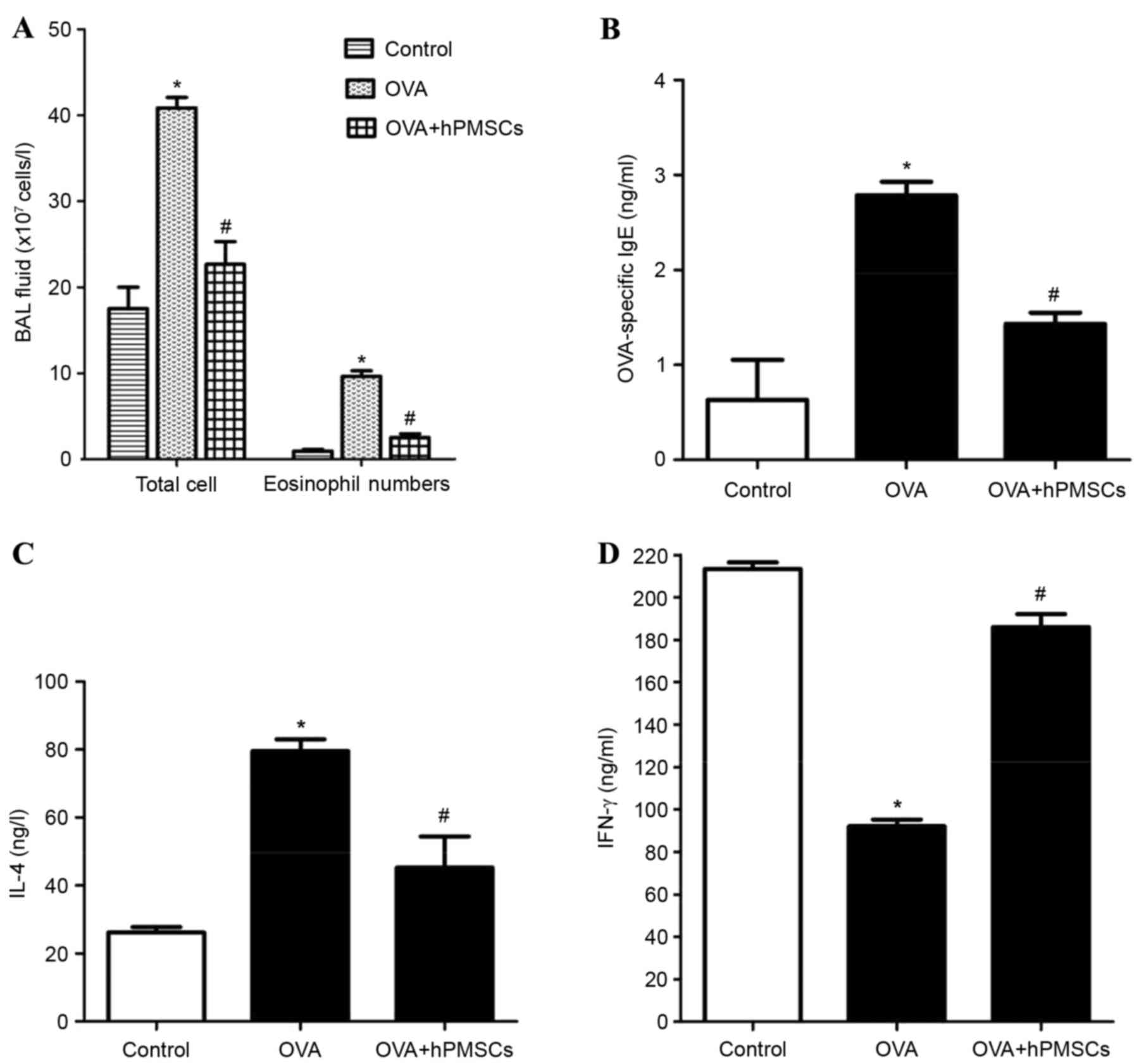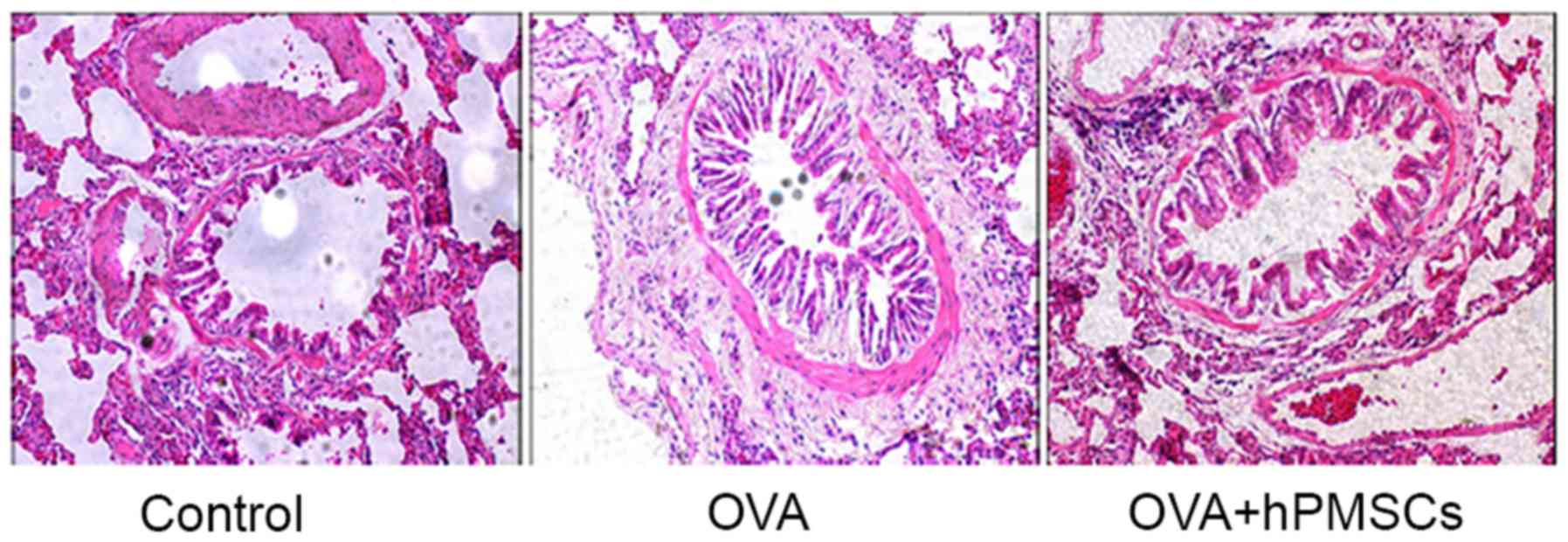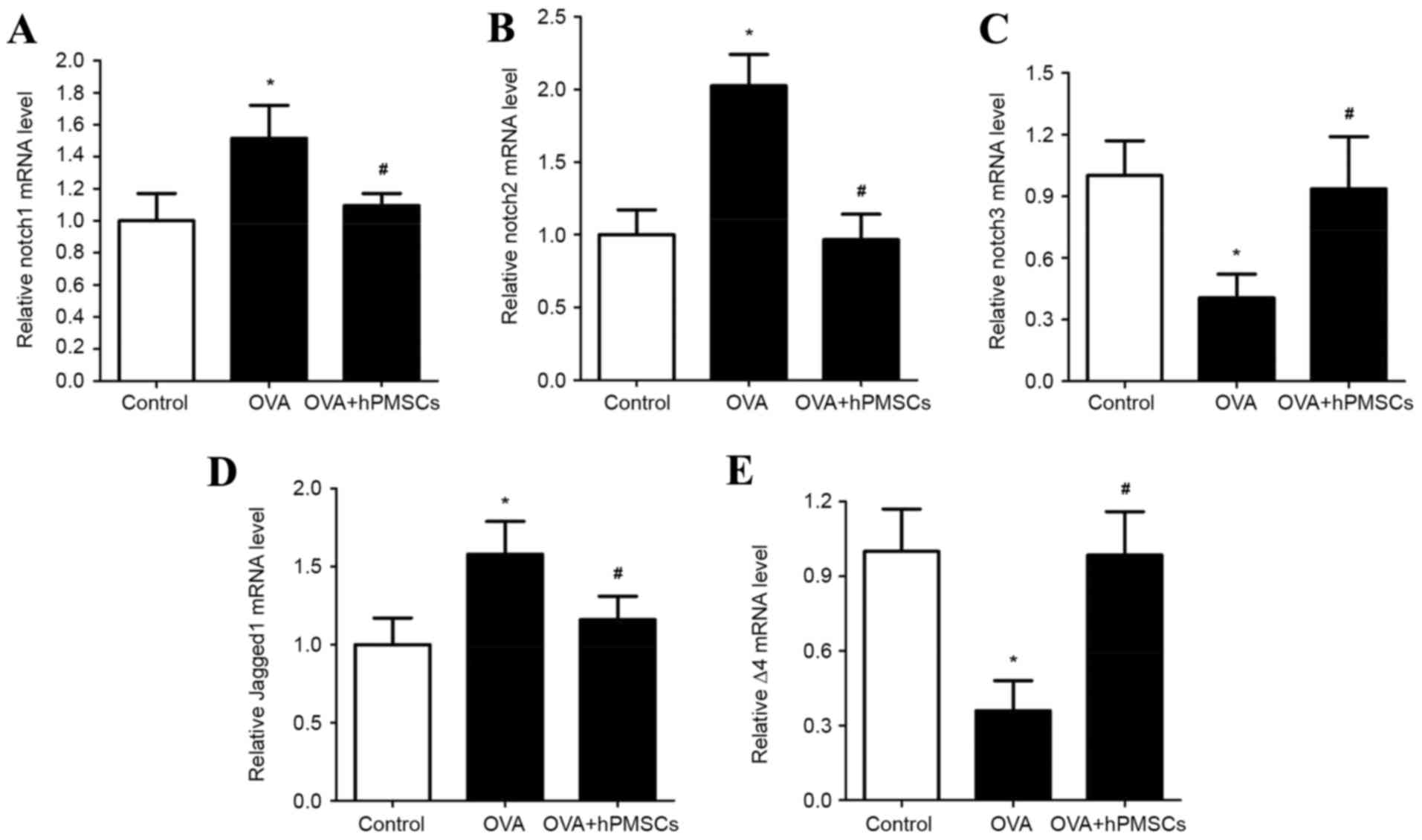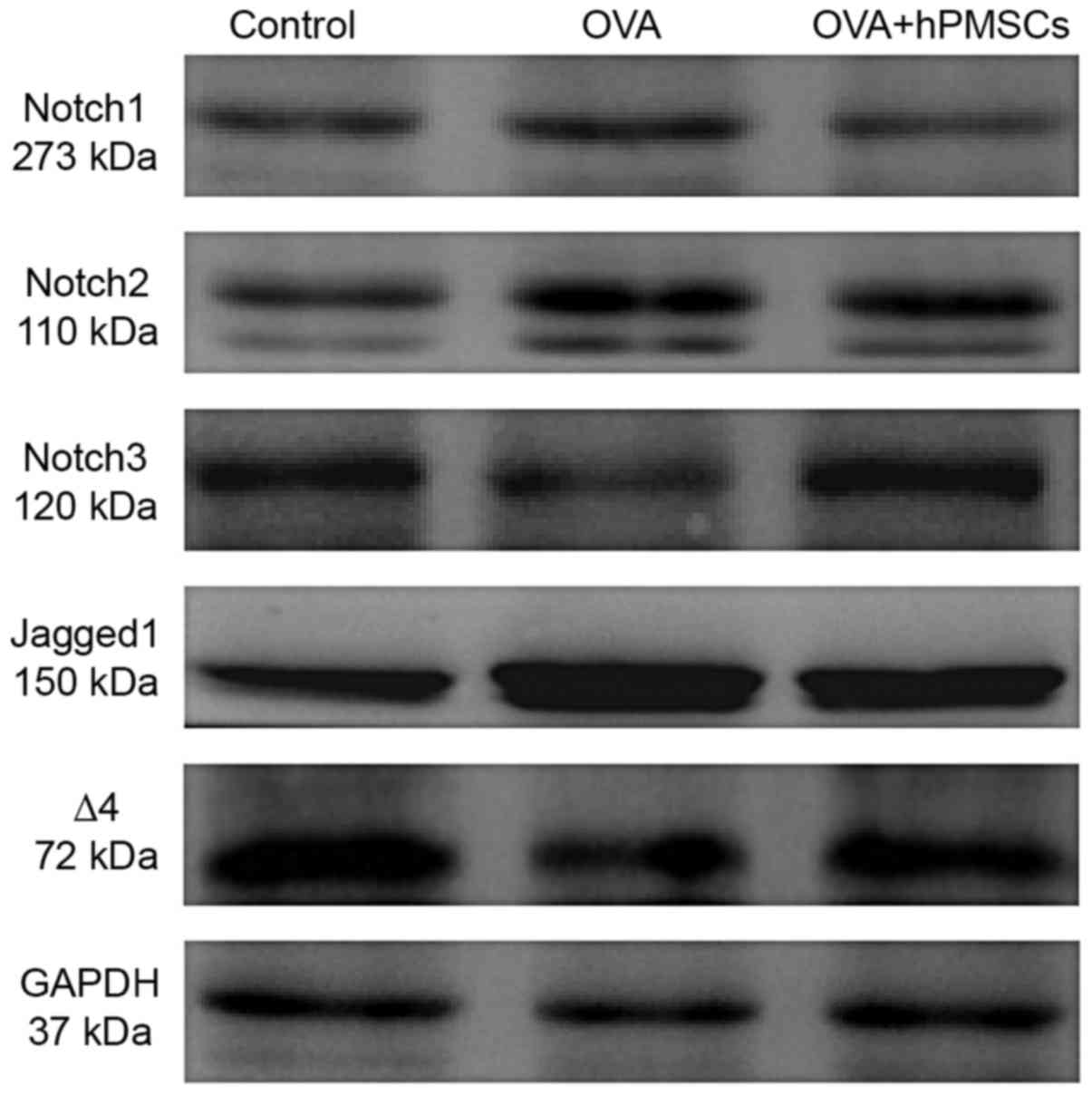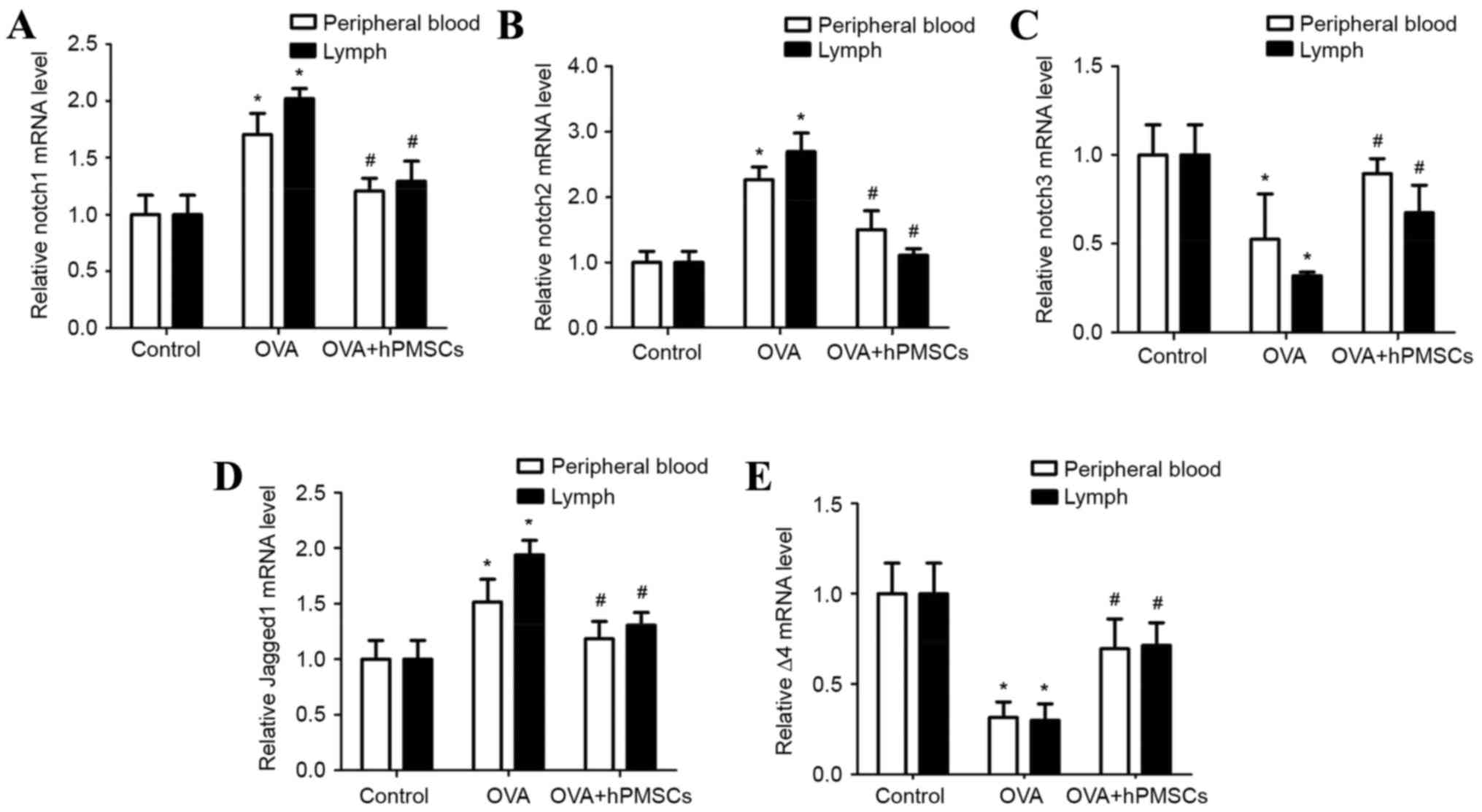|
1
|
Kupczyk M and Wenzel S: U.S. and European
severe asthma cohorts: What can they teach us about severe asthma?
J Intern Med. 272:121–132. 2012.
|
|
2
|
Wenzel S: Severe asthma: From
characteristics to phenotypes to endotypes. Clin Exp Allergy.
42:650–658. 2012. View Article : Google Scholar : PubMed/NCBI
|
|
3
|
Rutz S, Mordmüller B, Sankano S and
Scheffold A: Notch ligands Delta-like1, Delta-like4 and Jagged1
differentially regulate activation of peripheral T helper cells.
Eur J Immunol. 35:2443–2451. 2005. View Article : Google Scholar : PubMed/NCBI
|
|
4
|
Rao PE, Petrone AL and Ponath PD:
Differentiation and expansion of T cells with regulatory function
from human peripheral lymphocytes by stimulation in the presence of
TGF-{beta}. J Immunol. 174:1446–1455. 2005. View Article : Google Scholar : PubMed/NCBI
|
|
5
|
Del Papa B, Sportoletti P, Cecchini D,
Rosati E, Balucani C, Baldoni S, Fettucciari K, Marconi P, Martelli
MF, Falzetti F and Di Ianni M: Notch1 modulates mesenchymal stem
cells mediated regulatory T-cell induction. Eur J Immunol.
43:182–187. 2013. View Article : Google Scholar : PubMed/NCBI
|
|
6
|
Bassi ÊJ, Moraes-Vieira PM, Moreira-Sá CS,
Almeida DC, Vieira LM, Cunha CS, Hiyane MI, Basso AS, Pacheco-Silva
A and Câmara NO: Immune regulatory properties of allogeneic
adipose-derived mesenchymal stem cells in the treatment of
experimental autoimmune diabetes. Diabetes. 61:2534–2545. 2012.
View Article : Google Scholar : PubMed/NCBI
|
|
7
|
Mariñas-Pardo L, Mirones I, Amor-Carro O,
Fraga-Iriso R, Lema-Costa B, Cubillo I, Rodríguez Milla MÁ,
García-Castro J and Ramos-Barbón D: Mesenchymal stem cells regulate
airway contractile tissue remodeling in murine experimental asthma.
Allergy. 69:730–740. 2014. View Article : Google Scholar : PubMed/NCBI
|
|
8
|
Bassi EJ, Aita CA and Câmara NO: Immune
regulatory properties of multipotent mesenchymal stromal cells:
Where do we stand? World J Stem Cells. 3:1–8. 2011. View Article : Google Scholar : PubMed/NCBI
|
|
9
|
Machado Cde V, Telles PD and Nascimento
IL: Immunological charac-teristics of mesenchymal stem cells. Rev
Bras Hematol Hemoter. 35:62–67. 2013. View Article : Google Scholar : PubMed/NCBI
|
|
10
|
Aggarwal S and Pittenger MF: Human
mesenchymal stem cells modulate allogeneic immune cell responses.
Blood. 105:1815–1822. 2005. View Article : Google Scholar : PubMed/NCBI
|
|
11
|
Asari S, Itakura S, Ferreri K, Liu CP,
Kuroda Y, Kandeel F and Mullen Y: Mesenchymal stem cells suppress
B-cell terminal differentiation. Exp Hematol. 37:604–615. 2009.
View Article : Google Scholar : PubMed/NCBI
|
|
12
|
Ryan JM, Barry FP, Murphy JM and Mahon BP:
Mesenchymal stem cells avoid allogeneic rejection. J Inflamm
(Lond). 2:82005. View Article : Google Scholar : PubMed/NCBI
|
|
13
|
Jonuleit H, Schmitt E, Schuler G, Knop J
and Enk AH: Induction of interleukin 10-producing, nonproliferating
CD4(+) T cells with regulatory properties by repetitive stimulation
with allogeneic immature human dendritic cells. J Exp Med.
192:1213–1222. 2000. View Article : Google Scholar : PubMed/NCBI
|
|
14
|
Yamazaki S, Iyoda T, Tarbell K, Olson K,
Velinzon K, Inaba K and Steinman RM: Direct expansion of functional
CD25+ CD4+ regulatory T cells by antigen-processing dendritic
cells. J Exp Med. 198:235–247. 2003. View Article : Google Scholar : PubMed/NCBI
|
|
15
|
Morelli AE and Thomson AW: Tolerogenic
dendritic cells and the quest for transplant tolerance. Nat Rev
Immunol. 7:610–621. 2007. View
Article : Google Scholar : PubMed/NCBI
|
|
16
|
Maldonado RA and von Andrian UH: How
tolerogenic dendritic cells induce regulatory T cells. Adv Immunol.
108:111–165. 2010. View Article : Google Scholar : PubMed/NCBI
|
|
17
|
Kavanagh H and Mahon BP: Allogeneic
mesenchymal stem cells prevent allergic airway inflammation by
inducing murine regulatory T cells. Allergy. 66:523–531. 2011.
View Article : Google Scholar : PubMed/NCBI
|
|
18
|
Yang M, Zhao X, Liu Y, Tian Y, Ran X and
Jiang Y: A role for WNT1-inducible signaling protein-1 in airway
remodeling in a rat asthma model. Int Immunopharmacol. 17:350–357.
2013. View Article : Google Scholar : PubMed/NCBI
|
|
19
|
Livak KJ and Schmittgen TD: Analysis of
relative gene expression data using real-time quantitative PCR and
the 2(-Delta Delta C(T)) method. Methods. 25:402–408. 2001.
View Article : Google Scholar : PubMed/NCBI
|
|
20
|
Srour N and Thébaud B: Stem cells in
animal asthma models: A systematic review. Cytotherapy.
16:1629–1642. 2014. View Article : Google Scholar : PubMed/NCBI
|
|
21
|
Li X, Bai J, Ji X, Li R, Xuan Y and Wang
Y: Comprehensive characterization of four different populations of
human mesenchymal stem cells as regards their immune properties,
proliferation and differentiation. Int J Mol Med. 34:695–704. 2014.
View Article : Google Scholar : PubMed/NCBI
|
|
22
|
Yun HM, Kim HS, Park KR, Shin JM, Kang AR,
Il Lee K, Song S, Kim YB, Han SB, Chung HM and Hong JT:
Placenta-derived mesenchymal stem cells improve memory dysfunction
in an Aβ1-42-infused mouse model of Alzheimer's disease. Cell Death
Dis. 4:e9582013. View Article : Google Scholar : PubMed/NCBI
|
|
23
|
Kong P, Xie X, Li F, Liu Y and Lu Y:
Placenta mesenchymal stem cell accelerates wound healing by
enhancing angiogenesis in diabetic Goto-Kakizaki (GK) rats. Biochem
Biophys Res Commun. 438:410–419. 2013. View Article : Google Scholar : PubMed/NCBI
|
|
24
|
Stoff A, Rivera AA, Sanjib Banerjee N,
Moore ST, Michael Numnum T, Espinosa-de-Los-Monteros A, Richter DF,
Siegal GP, Chow LT, Feldman D, et al: Promotion of incisional wound
repair by human mesenchymal stem cell transplantation. Exp
Dermatol. 18:362–369. 2009. View Article : Google Scholar : PubMed/NCBI
|
|
25
|
Chan CK, Lin TC, Huang YA, Chen YS, Wu CL,
Lo HY, Kuo ML, Wu KH and Huang JL: The modulation of Th2 immune
pathway in the immunosuppressive effect of human umbilical cord
mesenchymal stem cells in a murine asthmatic model. Inflamm Res.
65:795–801. 2016. View Article : Google Scholar : PubMed/NCBI
|
|
26
|
Radtke F, Wilson A, Mancini SJ and
MacDonald HR: Notch regulation of lymphocyte development and
function. Nat Immunol. 5:247–253. 2004. View Article : Google Scholar : PubMed/NCBI
|
|
27
|
Krishnaswamy S, Verdile G, Groth D,
Kanyenda L and Martins RN: The structure and function of
Alzheimer's gamma secretase enzyme complex. Crit Rev Clin Lab Sci.
46:282–301. 2009. View Article : Google Scholar : PubMed/NCBI
|
|
28
|
Berezovska O, Jack C, Deng A, Gastineau N,
Rebeck GW and Hyman BT: Notch1 and amyloid precursor protein are
competitive substrates for presenilin1-dependent gamma-secretase
cleavage. J Biol Chem. 276:30018–30023. 2001. View Article : Google Scholar : PubMed/NCBI
|
|
29
|
Cui ZL, Gu W, Ding T, Peng XH, Chen X,
Luan CY, Han RC, Xu WG and Guo XJ: Histone modifications of Notch1
promoter affect lung CD4+ T cells differentiation in asthmatic
rats. Int J Immunopathol Pharmacol. 26:371–381. 2013. View Article : Google Scholar : PubMed/NCBI
|
|
30
|
De Strooper B, Annaert W, Cupers P, Saftig
P, Craessaerts K, Mumm JS, Schroeter EH, Schrijvers V, Wolfe MS,
Ray WJ, et al: A presenilin-1-dependent gamma-secretase-like
protease mediates release of Notch intracellular domain. Nature.
398:518–522. 1999. View
Article : Google Scholar : PubMed/NCBI
|
|
31
|
Karlström H, Bergman A, Lendahl U, Näslund
J and Lundkvist J: A sensitive and quantitative assay for measuring
cleavage of presenilin substrates. J Biol Chem. 277:6763–6766.
2002. View Article : Google Scholar : PubMed/NCBI
|
|
32
|
Guo XJ, Zhou M, Ren LP, Yang M, Huang SG
and Xu WG: Small interfering RNA mediated knockdown of Notch1 in
lung T cells of asthmatic mice affects T cell differentiation. Chin
Med J (Engl). 122:2647–2651. 2009.PubMed/NCBI
|
|
33
|
Fang TC, Yashiro-Ohtani Y, Del Bianco C,
Knoblock DM, Blacklow SC and Pear WS: Notch directly regulates
Gata3 expression during T helper 2 cell differentiation. Immunity.
27:100–110. 2007. View Article : Google Scholar : PubMed/NCBI
|
|
34
|
Osborne BA and Minter LM: Notch signalling
during peripheral T-cell activation and differentiation. Nat Rev
Immunol. 7:64–75. 2007. View Article : Google Scholar : PubMed/NCBI
|
|
35
|
Bailis W, Yashiro-Ohtani Y, Fang TC,
Hatton RD, Weaver CT, Artis D and Pear WS: Notch simultaneously
orchestrates multiple helper T cell programs independently of
cytokine signals. Immunity. 39:148–159. 2013. View Article : Google Scholar : PubMed/NCBI
|
|
36
|
Okamoto M, Matsuda H, Joetham A, Lucas JJ,
Domenico J, Yasutomo K, Takeda K and Gelfand EW: Jagged1 on
dendritic cells and Notch on CD4+ T cells initiate lung allergic
responsiveness by inducing IL-4 production. J Immunol.
183:2995–3003. 2009. View Article : Google Scholar : PubMed/NCBI
|
|
37
|
Zong D, Ouyang R, Li J, Chen Y and Chen P:
Notch signaling in lung diseases: Focus on Notch1 and Notch3. Ther
Adv Respir Dis. 10:468–484. 2016. View Article : Google Scholar : PubMed/NCBI
|
|
38
|
Shi YH, Shi GC, Wan HY, Jiang LH, Ai XY,
Zhu HX, Tang W, Ma JY, Jin XY and Zhang BY: Coexistence of Th1/Th2
and Th17/Treg imbalances in patients with allergic asthma. Chin Med
J (Engl). 124:1951–1956. 2011.PubMed/NCBI
|
|
39
|
Xu W, Lan Q, Chen M, Chen H, Zhu N, Zhou
X, Wang J, Fan H, Yan CS, Kuang JL, et al: Adoptive transfer of
induced-Treg cells effectively attenuates murine airway allergic
inflammation. PLoS One. 7:e403142012. View Article : Google Scholar : PubMed/NCBI
|
|
40
|
Kearley J, Robinson DS and Lloyd CM:
CD4+CD25+ regulatory T cells reverse established allergic airway
inflammation and prevent airway remodeling. J Allergy Clin Immunol.
122:617–624.e6. 2008. View Article : Google Scholar : PubMed/NCBI
|
|
41
|
Kared H, Adle-Biassette H, Foïs E, Masson
A, Bach JF, Chatenoud L, Schneider E and Zavala F:
Jagged2-expressing hematopoietic progenitors promote regulatory T
cell expansion in the periphery through notch signaling. Immunity.
25:823–834. 2006. View Article : Google Scholar : PubMed/NCBI
|
|
42
|
Li Y, Li H, Cao Y, Wu F, Ma W, Wang Y and
Sun S: Placenta-derived mesenchymal stem cells improve airway
hyperresponsiveness and inflammation in asthmatic rats by
modulating the Th17/Treg balance. Mol Med Rep. 16:8137–8145. 2017.
View Article : Google Scholar : PubMed/NCBI
|
|
43
|
Cahill EF, Tobin LM, Carty F, Mahon BP and
English K: Jagged-1 is required for the expansion of CD4+ CD25+
FoxP3+ regulatory T cells and tolerogenic dendritic cells by murine
mesenchymal stromal cells. Stem Cell Res Ther. 6:192015. View Article : Google Scholar : PubMed/NCBI
|
















